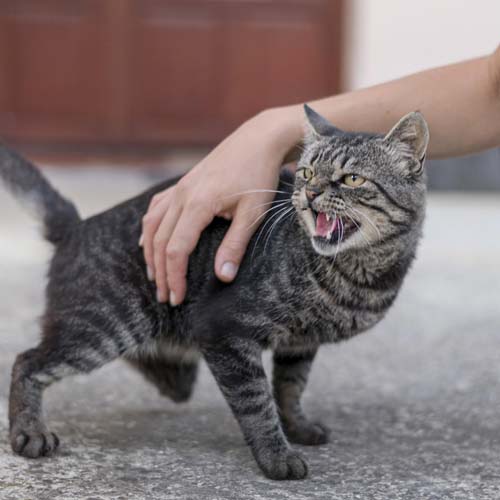Senior Cat Care
The Health and Wellbeing of My Senior Cat
At Cloverleaf Animal Hospital, we provide the best senior cat care services for your pet.

How will getting older impact the health of my cat?
So I chuckle at this question because we all know as we age, there are certain things that we chuckle and say, we’re not that young anymore. And so, unfortunately, with kitties, there can be some issues as well as they get older. So the first thing is that owners typically will come in for an exam because they notice their cat slowing down. So maybe they’re not able to jump up on the furniture, or they don’t want to jump on their favorite cat tree or their favorite chair anymore. Unfortunately, that could indicate some arthritis issues or just some discomfort with joint pain, and not necessarily full-blown arthritis, but maybe some early signs of that. One of the other things that we look for in aging kitties is changes in their eating and drinking habits. Maybe they’re not eating as well, dropping food, or getting more finicky. Perhaps you’re seeing them drinking more or less water. Also, the urine output. Sometimes we’ll have clients say, “Oh, I’ve noticed I’m scooping out more piles of urine in the box.” And even though I have multiple cats, that’s unusual. Sometimes, just little cues like that can show us that, unfortunately, there could be some underlying issues.
How do a cat's nutritional needs change as they age?
I would call a senior kitty a cat around the age of eight to ten. That is sometimes surprising for owners because we know kitties can live well into their twenties, but typically around the age of eight and ten, we want to pay more attention to what they’re eating and what they’re drinking and eating habits are. You don’t necessarily have to change a diet unless they’re not on a good quality diet. Still, there are often recommendations for senior diets because the minerals or vitamins in that food are slightly different from those for a kitten or an adult cat. The senior diets will have glucosamine in the diet itself. So you wouldn’t have to have a supplement because that’s something that will help will joints. Overall, if there was truly an underlying medical problem, whether that’s maybe a liver issue, kidney problem, or even hyperthyroidism or urinary problems, sometimes we recommend a special diet. There could potentially be the need for a prescription diet or a specialty diet to help with those underlying conditions.
What are some signs and symptoms that your cat may be slowing down?
Typically, when we say slowing down, it could be physically in the sense that you’re not seeing them being active. They could be hiding a little more, not being as social, and not wanting to jump on and off furniture or their favorite bed or chair. Perhaps they attempt to jump, but they fall back or don’t quite make it. Also, if they’re sleeping more and their sleeping patterns change, they’re being more vocal during the evening or early morning hours. If there are changes in their overall behavior, that might be the first subtle clue that they’re just not feeling good or something’s bothering them.
What are some health complications or diseases that senior cats commonly experience?
The predominant illnesses or diseases we see in senior cats are typically kidney disease or hyperthyroidism, which is an overactive thyroid. We can see diabetes. It’s not necessarily a senior-related issue. Diabetes can happen in middle-aged cats that are overweight and then suddenly lose a lot of weight. We’re looking for diabetes, but what we frequently find as the two main issues are that cats, unfortunately, develop kidney disease and an overactive thyroid as they age.
What kinds of preventative care can help extend the life and health of my cat?
Here at Cloverleaf, we recommend yearly exams, from kitten until the end of the life. So if they’re coming in on a yearly basis, sometimes we’re checking things, and if there is an illness or something that we’re monitoring, they may be coming in two to three times a year to see us. But at least yearly exams allow us to talk to the clients and make sure that we’re asking those questions about behavior, eating habits, and litter box habits. Are clients noticing subtle changes? Do they think that there are any concerns? But we do recommend, as part of their yearly visits, not just the exam but also to do preventative blood work that allows us to look for those certain illnesses that they can develop as they get older.
Why are wellness exams and regular checkups important for senior cats?
Wellness and preventative care are important because our goal is early detection. If we’re able to find something earlier rather than later, it is definitely going to benefit the overall quality of the life of your cat. And so again, if we’re talking about kidney disease, maybe we, at the age of eight, saw a few changes in those kidney values; there were some subtle changes in their drinking and variating habits, and maybe their urine looked fine, so we ruled out a UTI or any type of infection. They were still concentrating. But we think this could be an early change occurring. So we’ll monitor that more closely, and we’ll have you come back for a recheck versus waiting until they’re symptomatic. Then we check and say, oh, now we’re at a monitor level. We’ve got some serious issues going on. The treatment will be different as well. With early detection, we’ll watch and monitor the blood work, but maybe we need to do a diet change or switch things in the environment versus if it’s a moderate to a severe case where we went over a year or two to determine, it slowly progressed or even rapidly progressed the chances of survival or having a happier and a better quality of life is less at that point. So early detection is our goal to help those kitties have a long healthy life.
What test might a senior cat need?
We recommend what we call the senior panel for our senior kitties. That includes a complete blood cell count. It’s looking for any changes in their cell counts between the different cell lines. It’s looking to see whether or not they’re potentially anemic or if they have any inflammation or infection. It also includes what we call a chemistry book. So we’re looking at the function of the liver, the kidneys, protein levels, and their electrolytes. We’re also looking at their thyroid function. Then, we recommend what we call a pro-BNP. And that’s basically an enzyme for cardiac function. For kitties, especially senior kitties, heart disease is one of the number one things that are frequently missed because it’s not typically presented like it is with a dog. So dogs, when they come in with heart problems, they’re lethargic, vomiting, or we hear a murmur that has gotten worse, they cough more. Tests don’t always show that.
So it’s kind of a hidden disease. So the pro-BNP is an enzyme test that has a baseline. And if that level becomes elevated or borderline before becoming elevated, we’re going to talk to the client about looking into that more. That would be a workup to look at the heart function. That could include x-rays or an echocardiogram to evaluate the heart’s overall function. We recommend that is included in our senior workup. We also recommend a urine analysis. That will help us look at the concentration and the pH of the urine to make sure there are no signs of infection, crystals, or any abnormal cells. We also recommend a fecal check to look for intestinal parasites as well.
What is the most important thing to know about caring for a senior cat?
The most important thing, I think, is just to know your cat. If you know their behavior and you’re aware that something might be changing, it could be best to say, “You know what, I don’t know if this is anything, but I’m going to get it checked out.” It can be very subtle for cats. Cats in nature don’t outwardly show that they’re sick because they don’t want their predators to be able to eat them. So in nature, you will see them hiding and not showing that they’re sick or they’re not feeling good. For cats, if you start to see this behavior change, like if they sleep in weird spots, hide, do not eat well, or have a change in their eating habits, it could be a wide variety of things going on. It could be as simple as a bad tooth or something more severe like kidney disease or hyperthyroidism. A lot of the diseases are treatable but not curable. So early detection makes it easier for us to help them have a better quality of life with the options we have if we find it earlier rather than later.
If you still have other questions and you’d like to reach out to us, you can call us directly at (330) 948-2002, email us, or reach out on social media. But please do reach out, and we’ll get back to you as fast as we can.
Veterinary Services
Below are all of the veterinary services we offer at Cloverleaf Animal Hospital. If you have any questions regarding our services, please feel free to call us.
